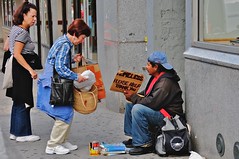AP Psych: Social Psychology Flashcards
Terms : Hide Images [1]
| 6628712494 | social psychology | def: the scientific study of how we think about, influence, and relate to one another ex: B=f(P,E) B= behavior P= person E= environment f= the function of |  | 0 |
| 6628712495 | attribution theory | def: the theory that we explain someone's behavior by crediting either the situation or the person's disposition ex: they are homeless because they are lazy and a drug addict |  | 1 |
| 6628712496 | fundamental attribution error | def: the tendency for observers, when analyzing another's behavior, to underestimate the impact of the situation and to overestimate the impact of personal disposition ex: they are speeding because they are a jerk (don't know that they are driving to the hospital) |  | 2 |
| 6628712497 | attitude | def: feelings, often influenced by our beliefs, that predispose us to respond in a particular way to objects, people, and events ex: see a person in a shirt for a rival sports team and automatically do not like them |  | 3 |
| 6628712498 | central route persuasion | def: attitude change path in which interested people focus on the arguments and respond with favorable thoughts ex: TV ad that uses laboratory evidence to demonstrate the effectiveness of an acne treatment |  | 4 |
| 6628712499 | peripheral route persuasion | def: attitude change path in which people are influenced by incidental cues, such as a speaker's attractiveness ex: determine the best candidate by how well he is dresses |  | 5 |
| 6628712500 | foot-in-the-door phenomenon | def: the tendency for people who have first agreed to a small request to comply later with a larger request ex: get you to volunteer for one hour at a charity, then get you to volunteer several hours a week |  | 6 |
| 6628712501 | role | def: a set of expectations (norms) about a social position, defining how those in the position ought to behave ex: women role- cook, care for children, etc. |  | 7 |
| 6628712502 | cognitive dissonance theory | def: the theory that we act to reduce the discomfort (dissonance) we feel when two of our thoughts (cognitions) are inconsistent ex: a pacifist punches someone, feels discomfort, and rethinks their beliefs to apply only to certain situations |  | 8 |
| 6628712503 | conformity | def: adjusting one's behavior or thinking to coincide with a group standard ex: wear clothes that are "popular" |  | 9 |
| 6628712504 | chameleon effect | def: unconscious mimicry of the postures, mannerisms, facial expressions, and other behaviors of one's interaction partners ex: person crosses their arms, so you cross your arms |  | 10 |
| 6628712505 | normative social influence | def: influence resulting from a person's desire to gain approval or avoid disapproval ex: applaud even when you don't like what just happened to avoid other people's judgement |  | 11 |
| 6628712506 | informational social influence | def: influence resulting from one's willingness to accept others' opinions about reality ex: if you don't know anything about basketball, but go to a game, you will simply follow along with those around you (cheer, boo, stand, sit, etc.) |  | 12 |
| 6628712507 | social facilitation | def: stronger responses on simple or well-learned tasks in the presence of others ex: perform better athletically when there is a big crowd |  | 13 |
| 6628712508 | social loafing | def: the tendency for people in a group to exert less effort when pooling their efforts toward attaining a common goal than when individually accountable ex: group projects |  | 14 |
| 6628712509 | deindividuation | def: the loss of self-awareness and self-restraint occurring in group situations that foster arousal and anonymity ex: soldiers killing during wartime |  | 15 |
| 6628712510 | group polarization | def: the enhancement of a group's prevailing inclinations through discussion within the group ex: group is against an idea, then listens to another opinions, and the group as a whole changes its opinion to the topic |  | 16 |
| 6628712511 | group think | def: the mode of thinking that occurs when the desire for harmony in a decision-making group overrides a realistic appraisal of alternatives ex: mass suicides, Bay of Pigs, riots |  | 17 |
| 6628712512 | culture | def: the enduring behaviors, ideas, attitudes, values, and traditions shared by a group of people and transmitted from one generation to the next ex: in relation to America, people in Europe have less personal space |  | 18 |
| 6628712513 | norm | def: an understood rule for accepted and expected behavior. Norms prescribe "proper" behavior ex: Muslim women wear hijabs/other veils |  | 19 |
| 6628712514 | personal space | def: the physical space around our bodies that we like to keep free ex: in the US, the average radius of intimate space is 1.5 feet |  | 20 |
| 6628712515 | prejudice | def: an unjustifiable (and usually negative) attitude toward a group and its members. Prejudice generally involves stereotyped beliefs, negative feelings, and a predisposition to discriminatory action ex: a person believes that people from Bali are less intelligent than those from Nepal |  | 21 |
| 6628712516 | stereotype | def: a generalized (sometimes accurate but often overgeneralized) belief about a group of people ex: Asian people are smarter than white people. |  | 22 |
| 6628712517 | discrimination | def: unjustifiable negative behavior toward a group and its members ex: against African Americans in 20th century |  | 23 |
| 6628712518 | ingroup | def: "Us"- people with whom we share a common identity ex: team you support |  | 24 |
| 6628712519 | outgroup | def: "Them"- those perceived as different or apart from our ingroup ex: rival team |  | 25 |
| 6628712520 | ingroup bias | def: the tendency to favor our own group ex: think your team is better than the other |  | 26 |
| 6628712521 | scapegoat theory | def: the theory that prejudice offers an outlet for anger by providing someone to blame ex: Germans used Jews as scapegoats for all their countries problems |  | 27 |
| 6628712522 | other-race effect | def: the tendency to recall faces of one's own race more accurately than faces of other races. Also called the cross-race effect and the own-race bias ex: white person more likely to recognize other white people's faces |  | 28 |
| 6628712523 | just-world phenomenon | def: the tendency for people to believe the world is just and that people therefore get what they deserve and deserve what they get ex: you get a good grade on a test because you are a good person. A different person gets a bad grade because they are a bad person. |  | 29 |
| 6628712524 | aggression | def: any physical or verbal behavior intended to hurt or destroy ex: bullying |  | 30 |
| 6628712525 | frustration-aggression hypothesis | def: the principle that frustration - the blocking or an attempt to achieve some goal- creates anger, which can generate aggression ex: person becomes frustrated with job then becomes aggressive at home to redirect frustration |  | 31 |
| 6628712526 | mere exposure effect | def: the phenomenon that repeated exposure to novel stimuli increases liking of them ex: see an advertisement for a product so many times you grow to like that product |  | 32 |
| 6628712527 | passionate love | def: an aroused state of intense positive absorption in another, usually present at the beginning of a love relationship ex: intense feelings and sexual attraction |  | 33 |
| 6628712528 | compassionate love | def: the deep affectionate attachment we feel for those with whom our lives are intertwined ex: feelings of mutual respect, trust, and affection |  | 34 |
| 6628712529 | equity | def: a condition in which people receive from a relationship in proportion to what they give to it ex: get paid for how much work you do |  | 35 |
| 6628712530 | self-disclosure | def: revealing intimate aspects of oneself to others ex: telling a counselor personal information so they can help you |  | 36 |
| 6628712531 | altruism | def: unselfish regard for the welfare of others ex: volunteer at nursing home, give money to those in need |  | 37 |
| 6628712532 | bystander effect | def: the tendency for any given bystander to be less likely to give aid if other bystanders are present ex: see a car wrecked on the side of the road but don't stop because you think someone else will |  | 38 |
| 6628712533 | social exchange theory | def: the theory that our social behavior is an exchange process, the aim of which is to maximize benefits and minimize costs ex: when the costs begin to outweigh the benefits in a relationship, one will often leave the relationship |  | 39 |
| 6628712534 | reciprocity norm | def: an expectation that people will help, not hurt, those who have helped them ex: if a person gets a gift for their birthday, they are more likely to give a gift to the other person on their birthday |  | 40 |
| 6628712535 | social-responsibility norm | def: an expectation that people will help those dependent upon them ex: help those affected by flooding |  | 41 |
| 6628712536 | conflict | def: a perceived incompatibility of actions, goals, or ideas ex: WWII |  | 42 |
| 6628712537 | social trap | def: a situation in which the conflicting parties, by each rationally pursuing their self-interest, become caught in mutually destructive behavior ex: each employee only wants to earn the most money possible |  | 43 |
| 6628712538 | mirror-image perceptions | def: mutual views often held by conflicting people, as when each side sees itself as ethical and peaceful and views the other side as evil and aggressive ex: US thought they were right in WWII, but so did Germany |  | 44 |
| 6628712539 | self-fulfilling prophecy | def: a belief that leads to its own fulfillment ex: think someone is mad at you, then you say something to make they mad at you |  | 45 |
| 6628712540 | super-ordinate goals | def: shared goals that override differences among people and require their cooperation ex: make two groups who don't like each other work together |  | 46 |
| 6628712541 | GRIT | def: Graduated and Reciprocated initiatives in Tension-Reduction- a strategy designed to decrease international tensions ex: work to decrease tensions between North Korea and South Korea |  | 47 |
